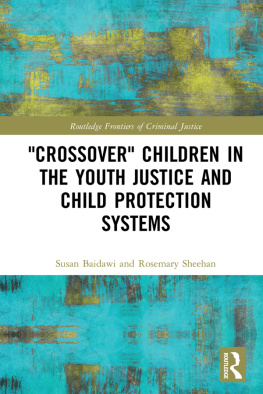THE POLITICS OF CHILDRENS SERVICES REFORM
Re-examining Two Decades of Policy Change
Carl Purcell
Foreword by Sir Paul Ennals
First published in Great Britain in 2020 by
Policy Press | North America office: |
University of Bristol | Policy Press |
1-9 Old Park Hill | c/o The University of Chicago Press |
Bristol | 1427 East 60th Street |
BS2 8BB | Chicago, IL 60637, USA |
UK | t: +1 773 702 7700 |
t: +44 (0)117 954 5940 | f: +1 773-702-9756 |
www.policypress.co.uk | www.press.uchicago.edu |
Policy Press 2020
British Library Cataloguing in Publication Data
A catalogue record for this book is available from the British Library
Library of Congress Cataloging-in-Publication Data
A catalog record for this book has been requested
ISBN 978-1-4473-4877-1 (paperback)
ISBN 978-1-4473-4876-4 (hardcover)
ISBN 978-1-4473-4879-5 (ePub)
ISBN 978-1-4473-4878-8 (ePdf)
The right of Carl Purcell to be identified as author of this work has been asserted by him in accordance with the Copyright, Designs and Patents Act 1988.
All rights reserved: no part of this publication may be reproduced, stored in a retrieval system, or transmitted in any form or by any means, electronic, mechanical, photocopying, recording, or otherwise without the prior permission of Policy Press.
The statements and opinions contained within this publication are solely those of the author and not of the University of Bristol or Policy Press. The University of Bristol and Policy Press disclaim responsibility for any injury to persons or property resulting from any material published in this publication.
Policy Press works to counter discrimination on grounds of gender, race, disability, age and sexuality.
Cover design by Qube Design Associates, Bristol.
Front cover image: Shutterstock: big-ben-label-450w-87221995
Printed and bound in Great Britain by CMP, Poole
Policy Press uses environmentally responsible print partners.
First, I owe a huge debt to everyone who agreed to be interviewed as part of the research for this book, most of whom remain anonymous. At the beginning of the project, I doubted how many people would be willing to talk to me about their involvement in this area of policymaking. Thankfully, my scepticism was entirely misplaced, and throughout the project, I have been impressed by the willingness of interviewees to share their insights, as well as put me in touch with former colleagues.
The book started off as an Economic and Social Research Council (ESRC)-funded PhD research project at Durham University, beginning in 2012. I would like to thank friends and colleagues in Durham, but particularly Dr Danny Chow for encouraging me to apply for the studentship in the first place and for his support thereafter. I would also like to thank Professor Ray Jones for his help when I was writing up the PhD and for encouraging me to submit a book proposal to Policy Press. Colleagues at Kings College London, particularly Professor Jill Manthorpe, have also helped immeasurably with the task of turning the PhD thesis into something more readable. I am also very grateful to Sir Paul Ennals for his kind and thought-provoking foreword to the book. Finally, I owe my biggest debt of gratitude to Professor Martin Laffin for supporting me all the way through what turned out to be an eight-year project.
Sir Paul Ennals
Writing in late 2019, it can feel as if government policies are largely driven by dogma. The checks and balances that normally contribute to good policy formation seem far away. The role of evidence, the input of professional civil servants, the balancing views of key elements of civil society none of these seem visible. However, it is important to remember that it was not always like this and, indeed, that, even today, much policy is still being filtered through the proper processes before bursting into government implementation.
Back in 1989, the Children Act provided a textbook example of how effective policy can be developed. A group of civil servants with profound understanding of their topic were willing to engage openly and directly with those key agencies who were working with the issues that children faced. Local authorities were deeply involved, and so too were a plethora of voluntary organisations. Debates were open and honest; research evidence was commissioned and studied; children and families were consulted. The result was an Act that has stood the test of time and still provides the backbone to our systems for keeping children safe, delivered by a Conservative government under Secretary of State Ken Clarke.








